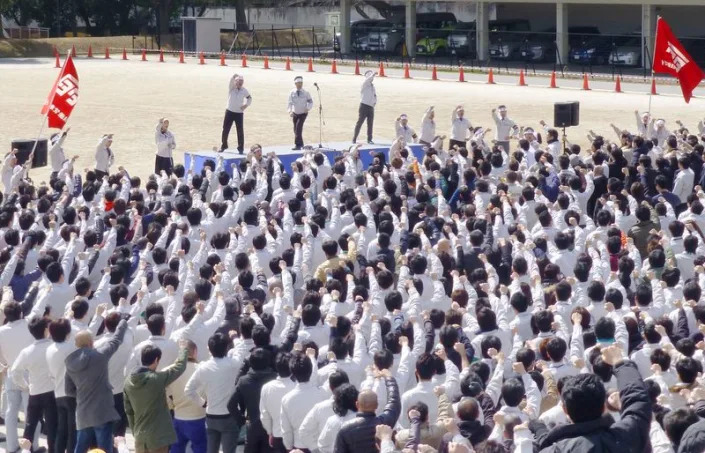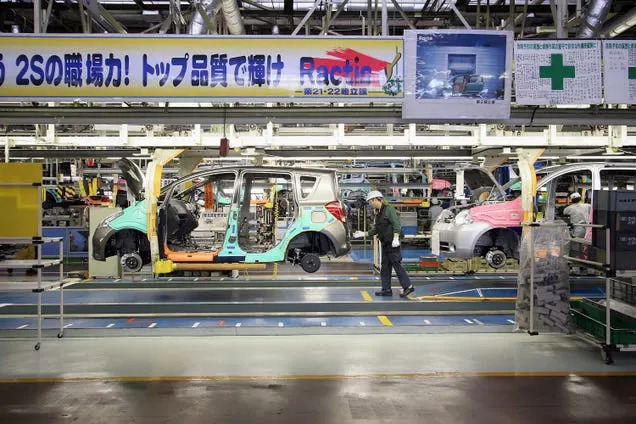
Members of the workers' union of Toyota Motor Corp. raise their fists as they shout slogans during a rally for the annual "shunto" wage negotiations at the company headquarters in Toyota
Tue, February 21, 2023
By Maki Shiraki and Eimi Yamamitsu
TOKYO (Reuters) -Toyota Motor Corp, the world's biggest automaker, said on Wednesday it would accept a union demand for the biggest base salary increase in 20 years and a rise in bonus payments, as Japan steps up calls for businesses to hike pay.
As one of Japan's biggest employers, Toyota has long served as a bellwether of the spring labour talks, which are in full swing at major companies. Many are expected to conclude swiftly as the government seeks inflation-beating wage hikes to ease burdens on consumers.
The automaker's incoming president Koji Sato said the decision to accept the union's demands in full at the first round of talks was meant not just for Toyota but "also for the industry as a whole, and in the hope that it will lead to frank discussions between labour and management at each company."
Within hours of Toyota's announcement, rival Honda Motor Co Ltd said it had agreed to union demands for a 5% pay increase. The average monthly base salary rise of 12,500 yen ($92.70) at Honda is the biggest jump since at least 1990.
Toyota and the union federation representing 357,000 Toyota group workers said the base pay rise was the biggest in two decades, though they both declined to provide the percentage increase.
With inflation running at around 4% - the highest level in 40 years following decades of deflation - Japan is under more pressure than ever before to raise wages to revive consumption.
But with the economy struggling - it averted recession in the fourth quarter but grew much less than expected - analysts say pay increases will remain limited to big firms, such as Toyota.
Small and medium-sized companies, which employ most Japanese workers, will struggle to afford pay rises, they say.
Toyota said its wage increase would also apply to part-time workers and senior contract workers and it had agreed to union's request for one-off bonus payments worth 6.7 months of wages.
Takaaki Sakagami, deputy secretary-general of the Federation of All Toyota Workers' Union, said the union was pleased it had been able to reach a deal with the company quickly.
The pay agreement comes as Prime Minister Fumio Kishida has stepped up calls on business leaders to accelerate wage increases, warning of a return to stagflation if pay rises fall short of the rapid increase in prices.
"We will boost consumption and expand domestic demand by promoting efforts toward structural wage increases," Kishida said at a lower house budget committee session on Wednesday.
Fast Retailing Co Ltd, which owns clothing giant Uniqlo, last month said it would boost pay by up to 40%, fuelling expectations big manufacturers would offer more at annual wage talks with unions this spring.
Video game maker Nintendo Co Ltd said earlier this month that it planned to lift workers' base pay by 10%, despite trimming its full-year profit forecast.
($1 = 134.8500 yen)
(Reporting by Maki Shiraki and Eimi Yamamitsu; Editing by Chang-Ran Kim, Bradley Perrett and Jamie Freed)
Toyota and Honda announce broad raises for Japanese workers

Diego Lasarte
Wed, February 22, 2023
Honda and Toyota announced that they had fully met the salary and bonus demands set out by the national automobile workers’ union on Wednesday, as the country’s largest automakers attempt to adjust wages in line with last year’s record inflation.
Honda announced it would raise wages by 5%, including the biggest increase in base pay in three decades as well as an annual bonus worth 6.4 months of pay. While Toyota did not reveal the specific raise, union representatives for the company confirmed it was Toyota’s largest wage hike in two decades.
The decision marks the third straight year that Toyota has fully met wage hike demands from its union, as the company prioritizes employee retention in the rapidly changing automobile market while looking to further develop its
electric vehicle technology and autonomous driving capabilities.
Wage growth has become a hot-button issue in the country, with the Bank of Japan (BOJ) signaling that it must continue to see wages growing at pace with the consumer price index in order to continue its current dovish policy, including the continuation of its $200 billion stimulus program meant to ease the effects of inflation.
What was Japan’s inflation rate last year?
Japan has seen record inflation this year, with the country’s consumer price index reaching its highest point since 1981. Despite this rapid growth, Japan has kept interest rates low, bucking macroeconomic trends. datawrapper-chart-664Pg
However, Japan’s approach to inflation might soon be changing as the central bank prepares for a new leader. Last week, Fumio Kishida nominated Kazuo Ueda as the next governor of the BOJ. An academic and former BOJ policy board member, Ueda was considered an unlikely choice for the role due to his conflicting views with current governor Haruhiko Kuroda.
Ueda is expected to raise interest rates, moving away from the central bank’s current ultra-easy monetary policy. He was nominated over BOJ deputy governor Masayoshi Amamiya, the frontrunner for the role and a proponent of the central bank’s current dovish stance.
Kishida told members of the Japanese parliament that Kuroda was the “best fit” for the BOJ.
“We expect the BOJ to continue to conduct appropriate monetary policy operations in coordination with the government, taking into account economic, price, and financial conditions,” Kishida said.
If confirmed by the parliamentary committee, Ueda will start the governorship after Kuroda’s term expires in April.
No comments:
Post a Comment